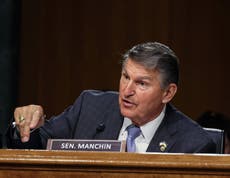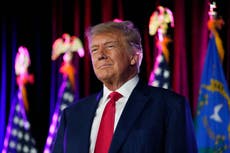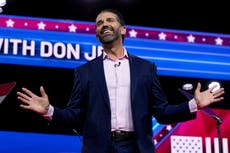The Independent's journalism is supported by our readers. When you purchase through links on our site, we may earn commission.
Joe Manchin is mulling a third-party run. Let’s hope Americans don’t fall for it

Your support helps us to tell the story
From reproductive rights to climate change to Big Tech, The Independent is on the ground when the story is developing. Whether it's investigating the financials of Elon Musk's pro-Trump PAC or producing our latest documentary, 'The A Word', which shines a light on the American women fighting for reproductive rights, we know how important it is to parse out the facts from the messaging.
At such a critical moment in US history, we need reporters on the ground. Your donation allows us to keep sending journalists to speak to both sides of the story.
The Independent is trusted by Americans across the entire political spectrum. And unlike many other quality news outlets, we choose not to lock Americans out of our reporting and analysis with paywalls. We believe quality journalism should be available to everyone, paid for by those who can afford it.
Your support makes all the difference.On Monday evening in New Hampshire, a potential third-party bid was brewing. The "centrist" political organization held a "Common Sense Town Hall" to discuss what could be the platform of a new ticket that could throw a wrench into the 2024 race.
No Labels claims that its objective is to influence the platforms of candidates in 2024 and to secure ballot access in all 50 states in the event they decide to run a third-party candidate after Super Tuesday. If they do run a candidate, they claim they want it to be a "unity ticket," with one Democrat and one Republican. Coincidentally (not really), the keynote panel at Monday’s event featured Democratic Senator Joe Manchin (WV) and former Republican Governor of Utah Jon Huntsman Jr.
Right out of the gate, both panelists were asked if they were the unity ticket. Manchin said that he has not made a decision on whether he will run, but very clearly left the door wide open, stating that if he were to run, he wouldn’t be a "spoiler," he would run to win. It’s unclear whether he’s just leaving that door open for the attention that comes with the speculation or if he’s serious. In any case, Manchin was eager to move on from the topic. Then, he started laying into both parties.
Manchin repeated his familiar retort that Republicans and Democrats have "gone too far right and too far left." This was a blatant exercise in both-sideism and false equivalency. By falsely equating the severity of the extremes in both parties, Manchin downplays the overt extremism that has overwhelmingly engulfed the Republican Party over the past decade. There is no equivalency between the extremes in either party. Depicting extremism as an equally significant phenomenon in both parties does a disservice to voters and enables the false narrative that "both parties are equally corrupt."
Objective reality shows us that the Democratic Party under President Joe Biden’s administration has gotten a lot done, especially on a bipartisan basis, and is actively trying to solve the problems Americans are facing while the Republican Party has become a party of obstructionism, extremism, and freedom oppression. Republicans would rather focus on "anti-woke" culture wars than do anything substantive for the American people.
As the panel went on, Joe Manchin doubled down on the critiques of his own party, stating that both political parties "have not delivered," seemingly ignoring what has gotten done and his own role in ensuring Biden didn’t deliver on some of his biggest promises. Manchin, along with Arizona Senator Krysten Sinema, was instrumental in sabotaging Biden’s initial Build Back Better Agenda in 2021. They later helped revive a much more slimmed-down version of it in 2022, but they did not revive much goodwill with the Democratic base. The animosity from the Dem base was so strong, that Sinema, facing fears of losing in a Democratic primary, shed the (D) next to her name and became an Independent. Manchin, on the other hand, is still a Democrat in name, but not in form.
Joe Manchin kept going, claiming that "both the Democratic Party and the Republican Party have benefited from dark money." When the host asked if No Labels should disclose their donors, Manchin dodged the question but said he would support overturning Citizens United. This is an interesting line of questioning, given that Democrats have accused No Labels of not disclosing their donors, which reportedly include GOP megadonors like Harlan Crow. Others are more direct about the intent of No Labels, arguing the organization’s sole purpose is to benefit Republicans. Wisconsin Democratic Party Chair Ben Wikler was even more blunt, stating: "If you peel off the No Labels label, you see the Trump campaign logo underneath."
This is what loomed over the event. When asked if Manchin or Hunstman have concerns about whether a unity ticket would damage Joe Biden and help the GOP candidate, Hunstman said that this is just the latest "taking point." Last week on CBS News, when asked about whether a unity ticket would be a spoiler, former Democratic congressman from South Carolina Joe Cunningham, the National Director of No Labels, stated that their internal polls show they pull evenly from both candidates. Both Huntsman’s and Cunningham’s points are contradicted by multiple other polls which indicated a centrist candidate would take a much larger portion of Biden’s voters than Donald Trump’s voters. And it’s also contradicted by Americans’ own lived experience.
Joe Biden’s coalition in 2020 was made up of Democrats, Independents, and moderate Republicans who were turned off by Trump and modern GOP extremism. A third-party candidate with a centrist platform could potentially siphon off some of those very same Independents and moderate Republicans. It wouldn’t take a significant number of votes to turn the tide either. History tells us even a few thousand voters supporting third-party bids can have disastrous results.
In some consequential recent history, 2016 third-party candidates Jill Stein and Gary Johnson helped hand the election to Donald Trump in key battleground states. In some states, Green Party Candidate Jill Stein’s total vote count was larger than Trump’s margin of victory. In Michigan, Stein garnered 51,463 votes, while Trump’s margin of victory over Hillary Clinton was only 10,704 votes. In Wisconsin, Stein garnered 31,702 votes total, while Trump’s margin of victory was 22,748. This is relevant because according to AP Votecase, Biden won former Gary Johnson and Jill Stein voters by 30 points in 2020. Where would they go if they were able to choose a third-party candidate again?
Given the polling from last month indicating that nearly half of Americans would consider supporting a third-party candidate in 2024 and the data showcasing how this would hurt Biden’s candidacy, No Labels needs to stick to its word. Joe Lieberman, Founding Chairman of No Labels, told ABC News that if polling shows their candidate would help one candidate or the other then they won’t nominate a third-party candidate. Whether or not they stand by that will come down to what their goal truly is.
If the goal of No Labels is to guide the country into a "Common Sense" future, they won’t run a third-party candidate in 2024. If their goal is to help elect another Republican president, then they will. And if Joe Manchin wants Democrats to remain in power, he would refuse to be the candidate. We’ll see what they do. But for the sake of American democracy, let’s hope Americans don’t fall for the third-party fallacy ever again.




Join our commenting forum
Join thought-provoking conversations, follow other Independent readers and see their replies
Comments